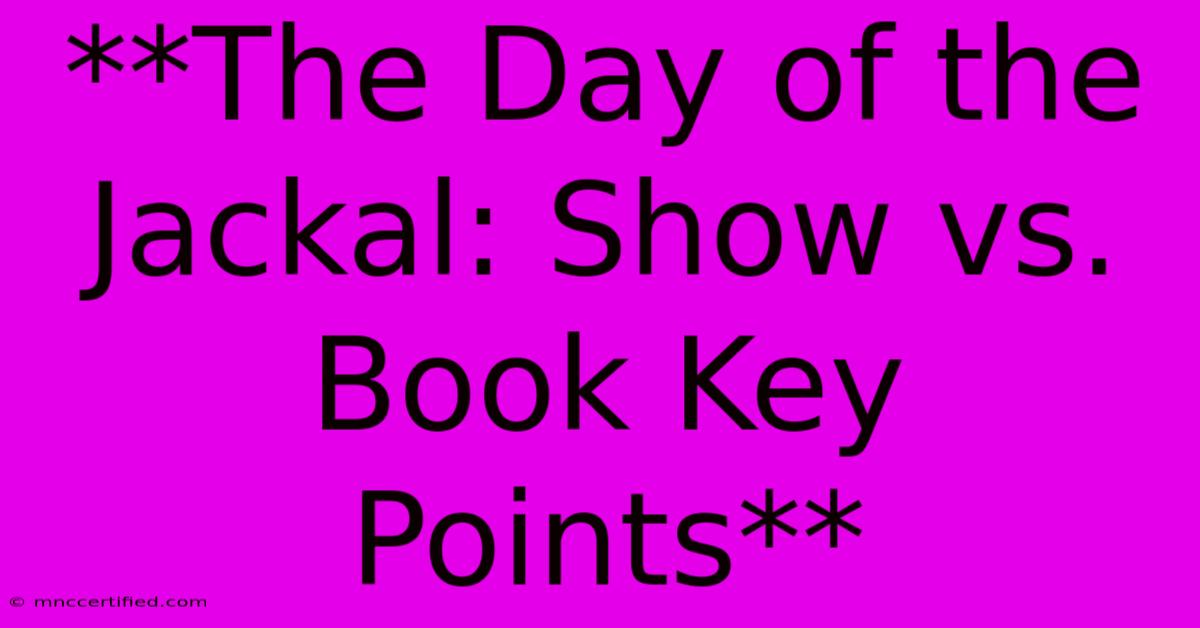**The Day Of The Jackal: Show Vs. Book Key Points**

Table of Contents
The Day of the Jackal: Show vs. Book - A Comparison of Key Points
Frederic Forsyth's 1971 novel, The Day of the Jackal, is a gripping thriller that captivated readers worldwide. It tells the story of a professional assassin, codenamed "The Jackal," hired to kill Charles de Gaulle, the President of France. The novel was adapted into a critically acclaimed film in 1973, starring Edward Fox as the Jackal and Michael Lon don as the detective pursuing him.
While both the novel and the film capture the suspense and intrigue of the story, there are some key differences in their approaches and content. This article will explore the major points of divergence between the book and the movie, offering a deeper understanding of each adaptation's unique strengths.
The Jackal's Identity and Motivation:
- The Book: The Jackal remains largely anonymous throughout the novel. His true identity, motivations, and past are shrouded in mystery, contributing to the intrigue and fear surrounding him.
- The Film: The film, while maintaining some anonymity, gives the Jackal a name – "Carlos" - and a more developed backstory. This provides a glimpse into his motivations, but also simplifies the enigmatic nature of the character present in the book.
The Chase and the Role of Detective LeClerc:
- The Book: The chase between the Jackal and the authorities is meticulously detailed, showcasing the meticulous planning and execution of the assassination attempt. Detective LeClerc, while crucial, is more of a figure in the background, relying on intelligence and deduction to track the Jackal.
- The Film: The film emphasizes the thrilling chase more explicitly, highlighting the Jackal's cunning and the detective's relentless pursuit. LeClerc's role is amplified, becoming more directly involved in the action and providing a more personal perspective on the events.
The Role of Politics and the French Government:
- The Book: The novel delves deeper into the political landscape of France and the motivations behind the assassination attempt, providing a more nuanced understanding of the power struggles and tensions within the government.
- The Film: While the film acknowledges the political context, it focuses primarily on the thrilling chase and the Jackal's meticulous preparations, streamlining the narrative and minimizing the political complexities.
The Ending:
- The Book: The book ends with a thrilling climax, culminating in a tense standoff between the Jackal and the authorities. The ultimate fate of the Jackal is left ambiguous, leaving a lingering sense of suspense and uncertainty.
- The Film: The film offers a more definitive ending, culminating in a final confrontation between the Jackal and LeClerc. The Jackal's fate is resolved, offering closure to the story but potentially sacrificing some of the novel's lingering suspense.
Conclusion:
Both the book and the film excel in their respective mediums. The novel provides a detailed and intricate exploration of the assassination attempt, while the film offers a visually captivating and suspenseful rendition of the story.
Ultimately, whether you prefer the book or the film, both adaptations offer a thrilling experience, capturing the essence of The Day of the Jackal. The novel delves deeper into the intricacies of the story and the political context, while the film provides a more accessible and visually engaging narrative. Both versions are worth experiencing for their individual strengths and contributions to the enduring legacy of this classic thriller.

Thank you for visiting our website wich cover about **The Day Of The Jackal: Show Vs. Book Key Points** . We hope the information provided has been useful to you. Feel free to contact us if you have any questions or need further assistance. See you next time and dont miss to bookmark.
Featured Posts
-
Chelsea Vs Fc Noah Conference League Match
Nov 08, 2024
-
Internet Access Fuels Porn Addiction In North Korea
Nov 08, 2024
-
Watch Live Manchester United Vs Paok Europa League
Nov 08, 2024
-
Interest Rates Fall To 4 75 Bank Of England
Nov 08, 2024
-
Guarantee Reserve Life Insurance Company
Nov 08, 2024